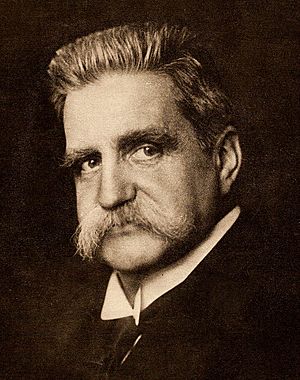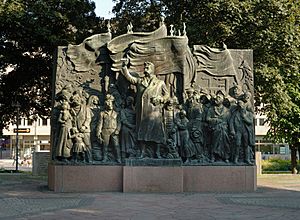Hjalmar Branting facts for kids
Quick facts for kids
Hjalmar Branting
|
|
|---|---|
 |
|
| Prime Minister of Sweden | |
| In office 18 October 1924 – 24 January 1925 |
|
| Monarch | Gustaf V |
| Preceded by | Ernst Trygger |
| Succeeded by | Rickard Sandler |
| In office 13 October 1921 – 19 April 1923 |
|
| Monarch | Gustaf V |
| Preceded by | Oscar von Sydow |
| Succeeded by | Ernst Trygger |
| In office 10 March 1920 – 27 October 1920 |
|
| Monarch | Gustaf V |
| Preceded by | Nils Edén |
| Succeeded by | Louis de Geer |
| Minister of Foreign Affairs | |
| In office 13 October 1921 – 19 April 1923 |
|
| Prime Minister | Himself |
| Preceded by | Herman Wrangel |
| Succeeded by | Carl Hederstierna |
| Minister of Finance | |
| In office 19 October 1917 – 5 January 1918 |
|
| Prime Minister | Nils Edén |
| Preceded by | Conrad Carleson |
| Succeeded by | Fredrik Vilhelm Thorsson |
| Personal details | |
| Born |
Karl Hjalmar Branting
23 November 1860 Stockholm, Sweden |
| Died | 24 February 1925 (aged 64) Stockholm, Sweden |
| Political party | Social Democrats |
| Spouse | Anna Branting (née Jäderin) |
| Children | Georg Branting Sonja Branting-Westerståhl |
| Signature |  |
Karl Hjalmar Branting (born November 23, 1860 – died February 24, 1925) was an important Swedish politician. He led the Swedish Social Democratic Party (SAP) from 1907 until he passed away in 1925. He also served as the Prime Minister of Sweden three times.
When Branting became Prime Minister in 1920, he was the first Social Democratic leader in Sweden's history. Later, in 1921, he became the first leader in Western Europe to be elected by universal suffrage (meaning everyone could vote) who believed in democratic socialism. This idea means working towards a fairer society through peaceful, democratic ways.
Branting helped change the Social Democratic Party from a small group into Sweden's main political party. Since 1914, the Social Democrats have been the largest party in every election. They even formed the government for 44 years straight, from 1932 to 1976. In 1921, Branting was honored with the Nobel Peace Prize for his efforts towards peace. He shared the prize with Christian Lous Lange from Norway.
Contents
His Story
Hjalmar Branting was born in Stockholm, Sweden. His father was a professor, and his mother was a talented pianist. Hjalmar studied in Stockholm and at Uppsala University. He was very good at math and astronomy and even worked at the Stockholm Observatory.
However, he decided to leave science in 1884 to become a journalist. He started editing newspapers like Tiden and Social-Demokraten. Social-Demokraten was the official newspaper of the Swedish Social Democratic Party.
Together with August Palm, Branting played a big part in starting the Swedish Social Democratic Party in 1889. He became the party's first Member of Parliament in 1896. For six years, he was the only Social Democratic member in the Swedish Parliament.
Working for Peace
In the early 1900s, Branting led the Social Democrats in stopping a possible war. This war would have forced Norway to stay united with Sweden. When the situation became serious in 1905, Branting famously said, "Hands off Norway, King!"
His party organized protests and prepared for a general strike to prevent the war. Many historians believe this was a major reason why Norway gained its independence peacefully. In 1908, Branting also started a political magazine called Tiden, which is still published today.
Political Ideas
Branting believed in a peaceful way to change society. He thought that if all workers could vote, they could use their votes to pass laws that would make society fairer. This was a different idea from some other socialists who thought change had to happen through revolution.
He supported the February Revolution in Russia in 1917, which aimed to create a more democratic government. He supported the moderate groups against the more extreme Bolsheviks. When the October Revolution happened later that year and the Bolsheviks took power, Branting spoke out against it. This led to some members leaving the Swedish Social Democratic Party.
Prime Minister and International Work
As Prime Minister, Hjalmar Branting helped Sweden join the League of Nations. This was an international organization created after World War I to help countries work together and prevent future wars. Branting was very active in the League.
For example, when there was a question about whether the Åland Islands should belong to Sweden or Finland, Branting let the League of Nations decide. The League decided the islands would be an autonomous region of Finland, meaning they would be part of Finland but have their own special rules. For his important work in the League of Nations, he received the Nobel Peace Prize in 1921.
Branting passed away in Stockholm on February 24, 1925. He was 64 years old. He had just started his third term as Prime Minister. After his death, Rickard Sandler became Prime Minister, and Per Albin Hansson became the party chairman. Hansson later served as Prime Minister for many years.
Monuments and Memorials
There is a special monument in Stockholm called the Branting Monument that honors Hjalmar Branting. In Gothenburg, there is also a tram and bus station named after him, called Hjalmar Brantingsplatsen. In Copenhagen, Denmark, a square was renamed Hjalmar Brantings Plads in his honor in 1925.
See also
 In Spanish: Hjalmar Branting para niños
In Spanish: Hjalmar Branting para niños
- 1921 Swedish general election
 | Janet Taylor Pickett |
 | Synthia Saint James |
 | Howardena Pindell |
 | Faith Ringgold |


